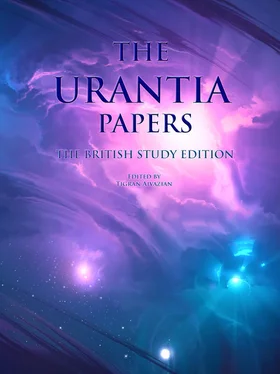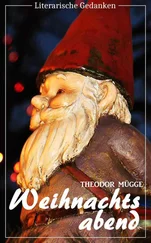Notes to Paper № 92
Level of values, In 1955 text: Level values. “Level values” has no discernible meaning in this context.
Notes to Paper № 94
far-distant, In 1955 text: far distant. This was the only instance of the un-hyphenated form “far distant” in the 1955 text. The committee’s decision to hyphenate and thereby standardize usage in The Urantia Book is the least complex resolution to the perceived problem of variant forms of the term and is in agreement with Webster’s of 1934.
Notes to Paper № 96
nonetheless, In 1955 text: none the less. The difference between “none the less” and “nonetheless” as followed throughout the 1955 text — except at this point — is thus: “None the less” is used where the meaning is a comparative roughly equivalent to “no less,” and the latter could be substituted without a change in meaning. “Nonetheless” is interchangeable with “nevertheless” and is used when the meaning approximates “even so.”
Touching, See the note on 2:1.1.
Notes to Paper № 100
Only,In 1955 text no comma. The comma after “Only” is required to convey the intended meaning, which approximates “however, in the second sketch you are favoured ...” as opposed to the meaning without the comma which would be “It is only in the the second sketch that you are favoured ...” Also note that for the sentence to work without the comma, “... sketch you are ...” would have to be inverted to “... sketch are you ...” in order to be grammatically correct.
Notes to Paper № 102
external, In 1955 text: eternal. While it may be possible to extract some meaning from the original wording, changing “eternal” to “external” on the basis of an assumed dropped keystroke in the original, suddenly makes the sentence not only clear in meaning but also reveals a contrastive point which is completely absent from the original. (This also resolves the otherwise completely opaque “Ethics is the eternal ... racial mirror ...”
Notes to Paper № 105
correlator, In 1955 text: corelater. Although it is possible that the original word (which is not found in either Webster’s or the OED) was a coined extension of corelation and corelative (both of which are found), it is not readily apparent how corelater would differ in meaning from correlator(s), the now standard form, which is found five times elsewhere in the text. The more likely situation is that two separate typographical errors were made when this word was set. The first was a dropped keystroke error at the end of a line of type; the second was an incorrect keystroke error, substituting e for o. This doubly misspelled word would still be difficult to catch in proofing because it would sound the same if read out loud, and interestingly enough, if it looked odd to a proofreader and consequently led him or her to consult the dictionary, the spelling could neither be confirmed nor denied by either Webster’s or the OED — neither dictionary contained correlator or corelater — and without an electronically searchable text, it is unlikely that the evidence of the otherwise unanimous usage within the revelation itself could have been brought to bear on the problem.
Notes to Paper № 106
unrevealed, In 1955 text: Unrevealed. The lowercase version appears to be correct because “unrevealed” does not seem to be part of the name but is solely descriptive (the title being found in several places without unrevealed preceding it). In the one other case in which “unrevealed” is found in conjunction with Consummator of Universe Destiny, it is not capitalized 0:12.7 in the text. [“Unrevealed” is found in one other location as a capitalized component of a title — The “Unrevealed Creative Agencies of the Ancients of Days” 30:1.108 — so such a format is possible.]
Notes to Paper № 107
INFORMATIONAL. First printing; The Adjuster is man’s eternitypossibility; man is the Adjuster’s personality possibility. — The original text does appear unusual at first glance because one expects a noun like ‘possibility’ to be modified by an adjective such as ‘eternal’; not by another noun. In this situation however, ‘eternity’ is not serving as an adjective, rather the two nouns together form a single concept or nominal group, identical in structure to the group which ends the subject sentence: “... man is the Adjuster’s personality possibility.”
Notes to Paper № 112
Vertical depth , In 1955 text: Vertical } depth. “Depth” should be italicized as it is the substantive paralleled by the other items in the context (“Breadth” and “Length” — both italicized) and “Vertical” is merely the modifier.
Notes to Paper № 114
over 1,000 mortals, Just a few paragraphs earlier, this number was said to be 962.
Notes to Paper № 118
free-willness, In 1955 text: freewillness. Free-willness is found at four other locations in the text and all in instances it refers to an attribute or characteristic of a being or beings. Freewill and free will each occur numerous times — the former as an adjective (modifying such words as choice, action, or personality), while the two-word form is used when free modifies will itself (i.e. when will is under discussion). In light of these consistent usages, conforming this variant is appropriate as the original was probably the result of a dropped hyphen.
pantheism, In 1955 text: Pantheism. Though religions and even philosophical schools are normally capitalized, e.g. “Platonism,” “Stoicism,” “Deism,” “pantheism” is more of a philosophical concept than an organized system of ideas and so is normally not capitalized — either currently or in writings contemporaneous with The Urantia Book.
Notes to Paper № 119
INFORMATIONALFirst printing; These men of God visited the newborn child in the manger. — “in the manger” removed at the second printing. Presumably, this change was made because the original seems to be inconsistent with the narrative of Jesus’ birth in 122:8, which states that three wise men from the east visited Jesus when he was almost three weeks old — about the time the family left the inn and over two weeks after they had moved out of the stable. However, it is certainly possible that Joseph and Mary might have taken the manger with them up to the room in the inn in order to continue to have a cradle for Jesus. The need for a cradle would have been no less in the room than in the stable, and if the manger was portable, as small feed-boxes often are, moving it along with the family seems quite reasonable.
sometime, In 1955 text: some time. See note for 60:3.20.
Notes to Paper № 122
Speak not of this matter, Note that no such warning was given by Gabriel to Elizabeth — clearly the life of Jesus was in even greater danger than that of John.
now reigns on high, I.e. Immanuel, Michael's elder brother.
Читать дальше






![Theresa Cheung - The Dream Dictionary from A to Z [Revised edition] - The Ultimate A–Z to Interpret the Secrets of Your Dreams](/books/692092/theresa-cheung-the-dream-dictionary-from-a-to-z-r-thumb.webp)





